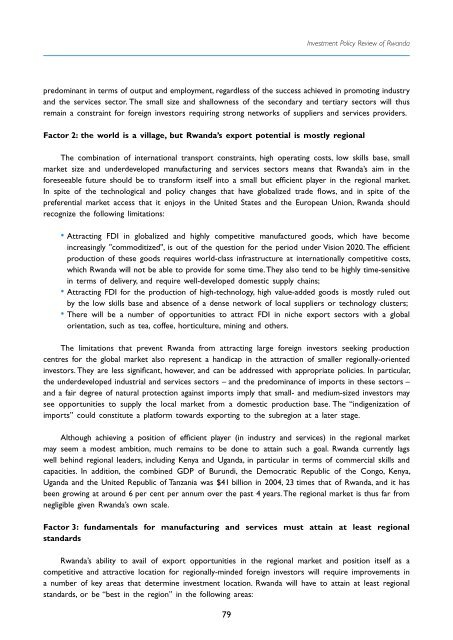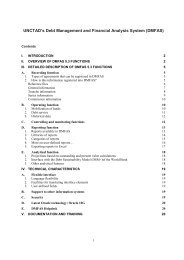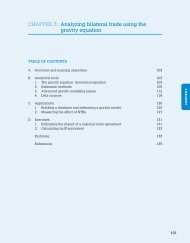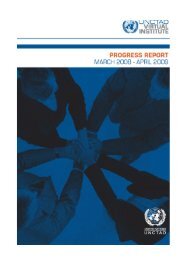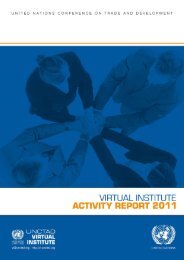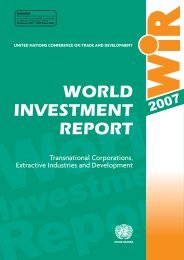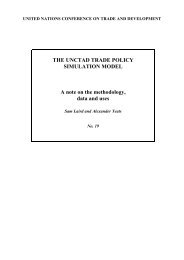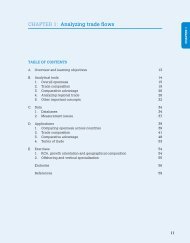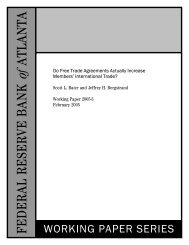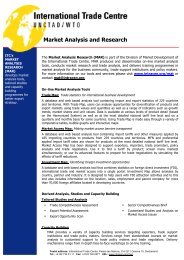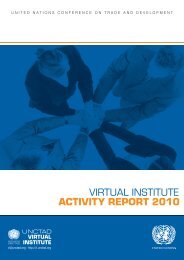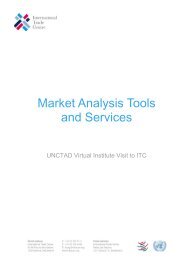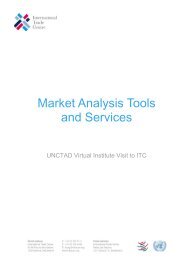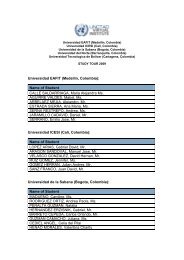Investment Policy Review - Rwanda - UNCTAD Virtual Institute
Investment Policy Review - Rwanda - UNCTAD Virtual Institute
Investment Policy Review - Rwanda - UNCTAD Virtual Institute
Create successful ePaper yourself
Turn your PDF publications into a flip-book with our unique Google optimized e-Paper software.
<strong>Investment</strong> <strong>Policy</strong> <strong>Review</strong> of <strong>Rwanda</strong><br />
predominant in terms of output and employment, regardless of the success achieved in promoting industry<br />
and the services sector. The small size and shallowness of the secondary and tertiary sectors will thus<br />
remain a constraint for foreign investors requiring strong networks of suppliers and services providers.<br />
Factor 2: the world is a village, but <strong>Rwanda</strong>’s export potential is mostly regional<br />
The combination of international transport constraints, high operating costs, low skills base, small<br />
market size and underdeveloped manufacturing and services sectors means that <strong>Rwanda</strong>’s aim in the<br />
foreseeable future should be to transform itself into a small but efficient player in the regional market.<br />
In spite of the technological and policy changes that have globalized trade flows, and in spite of the<br />
preferential market access that it enjoys in the United States and the European Union, <strong>Rwanda</strong> should<br />
recognize the following limitations:<br />
• Attracting FDI in globalized and highly competitive manufactured goods, which have become<br />
increasingly "commoditized", is out of the question for the period under Vision 2020. The efficient<br />
production of these goods requires world-class infrastructure at internationally competitive costs,<br />
which <strong>Rwanda</strong> will not be able to provide for some time. They also tend to be highly time-sensitive<br />
in terms of delivery, and require well-developed domestic supply chains;<br />
• Attracting FDI for the production of high-technology, high value-added goods is mostly ruled out<br />
by the low skills base and absence of a dense network of local suppliers or technology clusters;<br />
• There will be a number of opportunities to attract FDI in niche export sectors with a global<br />
orientation, such as tea, coffee, horticulture, mining and others.<br />
The limitations that prevent <strong>Rwanda</strong> from attracting large foreign investors seeking production<br />
centres for the global market also represent a handicap in the attraction of smaller regionally-oriented<br />
investors. They are less significant, however, and can be addressed with appropriate policies. In particular,<br />
the underdeveloped industrial and services sectors – and the predominance of imports in these sectors –<br />
and a fair degree of natural protection against imports imply that small- and medium-sized investors may<br />
see opportunities to supply the local market from a domestic production base. The “indigenization of<br />
imports” could constitute a platform towards exporting to the subregion at a later stage.<br />
Although achieving a position of efficient player (in industry and services) in the regional market<br />
may seem a modest ambition, much remains to be done to attain such a goal. <strong>Rwanda</strong> currently lags<br />
well behind regional leaders, including Kenya and Uganda, in particular in terms of commercial skills and<br />
capacities. In addition, the combined GDP of Burundi, the Democratic Republic of the Congo, Kenya,<br />
Uganda and the United Republic of Tanzania was $41 billion in 2004, 23 times that of <strong>Rwanda</strong>, and it has<br />
been growing at around 6 per cent per annum over the past 4 years. The regional market is thus far from<br />
negligible given <strong>Rwanda</strong>’s own scale.<br />
Factor 3: fundamentals for manufacturing and services must attain at least regional<br />
standards<br />
<strong>Rwanda</strong>’s ability to avail of export opportunities in the regional market and position itself as a<br />
competitive and attractive location for regionally-minded foreign investors will require improvements in<br />
a number of key areas that determine investment location. <strong>Rwanda</strong> will have to attain at least regional<br />
standards, or be “best in the region” in the following areas:<br />
79


